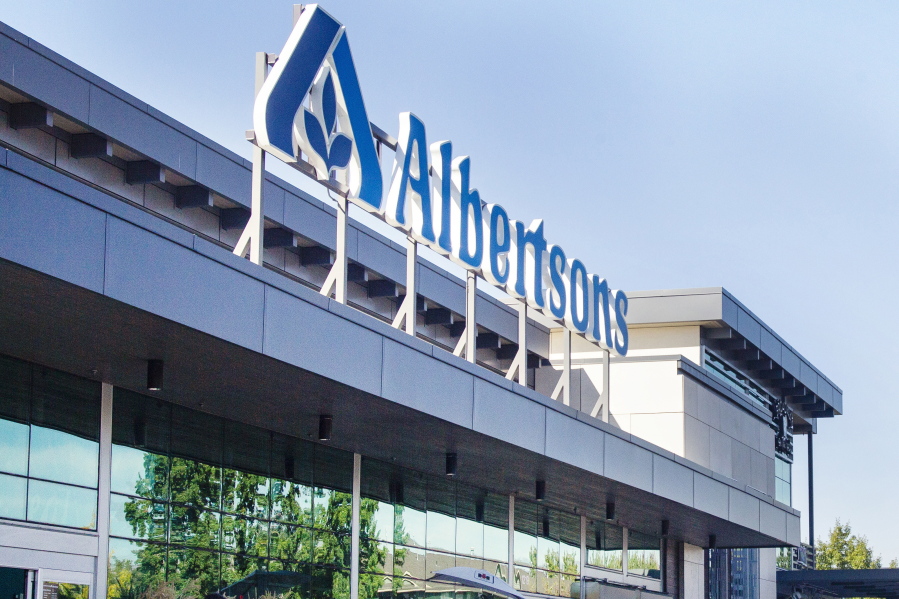SEATTLE — Opposition to a proposed merger between Kroger and Albertsons took a new turn last week after two dozen consumers, including a Kirkland man, filed the first formal challenge to the $25 billion deal.
The lawsuit, filed Feb. 2 in a California federal court, also seeks to halt a controversial $4 billion dividend by Albertsons to shareholders in the run-up to the merger.
The proposed marriage of Albertsons, which owns Safeway, and Kroger, parent of QFC and Fred Meyer, has been closely watched in the Seattle area since its October announcement. .
Last week’s suit was brought by 25 consumers, including Kirkland resident Clyde D. Stensrud, in 11 states. Federal law allows private suits to enforce antitrust laws.
Stensrud and his fellow plaintiffs contend that the “megamerger” would give the combined companies monopoly power over the U.S. grocery market, which “will be used to increase prices for groceries, decrease the quality of food, eliminate jobs, close stores and offer less choice for consumers,” according to the suit.
The suit also argues that Albertsons’ $4 billion dividend in advance of the merger is intended “to financially cripple Albertsons and to weaken its competitive position relative to Kroger.” Plaintiffs want to bar the payment or force shareholders to give up, or disgorge, any payment they have received.
The suit comes just weeks after the Washington state Supreme Court cleared the way for Albertsons to pay the dividend after state Attorney General Bob Ferguson had asked the court to review the case.
A separate effort to stop the dividend by California, Illinois and the District of Columbia was also turned aside by a federal judge in Washington, D.C.
An Albertsons spokesperson on Thursday declined to comment on the suit. Kroger did not respond to questions about the suit.
Cerberus Capital Management, which owns around 29 percent of Albertsons, also did not respond to an inquiry.
The suit claims the merger violates U.S. antitrust law because Albertsons and Kroger are significant rivals in the grocery business. “It’s competition that they are eliminating” through the merger, said attorney Joseph M. Alioto, whose San Francisco firm is one of two representing the plaintiffs, according to a Feb. 3 article by Reuters.
The suit is also the first to “directly challenge the merger,” said attorney Joseph Saveri, head of the second firm, in an email to The Seattle Times on Thursday. Saveri noted that the suit by Ferguson focused on the $4 billion dividend.
(The two firms, Alioto Law Firm and Joseph Saveri Law firm, are also involved in another merger case with Seattle-area implications: They represent plaintiffs suing to block Microsoft’s plan to acquire gaming giant Activision Blizzard.)
The suit drew a puzzled response from some observers.
Douglas Ross, an antitrust expert at the University of Washington School of Law, said it’s unclear what the plaintiffs hope to achieve with the suit.
The Federal Trade Commission and several states are likely to sue to block the merger, so “there wouldn’t seem to be a need for a private lawsuit on top of the governmental lawsuits,” Ross said.
The suit was also criticized for the way it characterizes the grocery market. A Kroger-Albertsons merger would control 36 percent of the “U.S. grocery supermarket operators,” according to the suit.
But as Daniel Kline, managing editor of TheStreet, pointed out in a Feb. 6 article, groceries are also sold by nonsupermarket operators, such Costco and Walmart, which the suit doesn’t mention.
Amazon alone accounts for around 25 percent of the grocery market. As a share of total grocery sales, a Kroger-Albertsons merger would control around 13 percent of the market, according to 2021 data from Euromonitor.
The suit “seems to not be aware that grocery chains don’t just compete with other grocery chains,” Kline said.
Saveri responded that stores like Walmart and Costco “sell other goods,” and that for the purposes of the suit, the list of supermarket operators is “the listing that matters.”
News of the proposed grocery merger last year raised concerns among many Seattle-area residents.
To get federal approval for deal, Kroger and Albertsons must sell off hundreds of locations where the soon-to-be-former competitors have too much market overlap.
In nearly a dozen Seattle-area neighborhoods, an Albertsons-owned store is less than a mile from its Kroger-owned competitor and might be included as part of any divestiture.
When the merger was announced last year, shoppers told The Seattle Times they worried it might lead to the closure of smaller locations of Safeway or QFC if a buyer for those locations could not be found.
The Times was unable to contact Stensrud, the Kirkland plaintiff. A person with the same name has also appeared in several other legal actions by the Alioto law firm involving corporate mergers, including an unsuccessful suit against the 2020 merger between Sprint and Bellevue-based T-Mobile.



